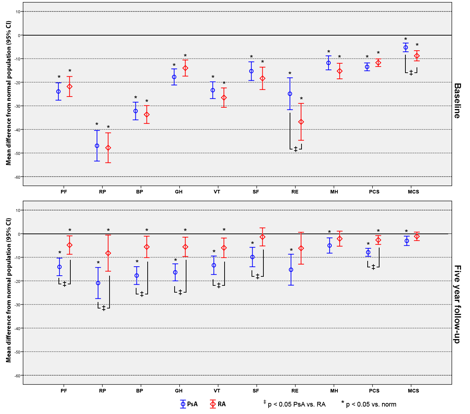Session Information
Session Type: Abstract Submissions (ACR)
Background/Purpose:
Studies on early psoriatic arthritis (ePsA) are still rare and data on health related quality of life (HRQoL) in ePsA are lacking completely. To assess the degree of HRQoL reduction compared to the background population in ePsA at diagnosis and during the first 5 years of follow-up in patients exposed to Swedish standard of care. To compare HRQoL in ePsA and early RA (eRA) and analyze associations and predictors at baseline.
Methods:
Patients included in the Swedish early psoriatic arthritis (SwePsA) and the Swedish early Intervention in RA (TIRA 2) registries having available SF 36 assessments at baseline and 5-year follow-up, were included. Differences from expected levels were calculated for each individual patient and used for the analysis, thus making further age and gender adjustment unnecessary. Measures of physical function (HAQ), disease activity (DAS-28), delay before diagnosis, smoking (only in PsA), pain and general well-being (VAS) were used as explanatory variables. Adequate T-tests as well as uni-and multivariate linear regression analysis were performed.
Results:
Both RA (n= 133, 73% women) and PsA (n=166, 52% women) patients displayed a profound statistically significant reduction of HRQoL when being diagnosed with their chronic joint disease. In general the degree of impairment at baseline was similar. However, after 5 years the eRA group had almost normalized their HRQoL, while the ePsA patients still suffered from significant decrease in several SF-36 domains. Figure. A comparison of baseline variables between RA and ePsA revealed longer symptom duration before diagnosis in PsA, a factor independently contributing to hampered improvement during follow-up. Disease activity measured as DAS-28 (and its components) and physical dysfunction measured as HAQ were more severe in TIRA 2-RA patients, possibly motivating early aggressive intervention. In ePsA high disease activity and impaired function at inclusion were associated with worse outcome. In ePsA also current smoking status contributed independently to persistent impairment of HRQoL.
Conclusion:
Both newly diagnosed RA and PsA are characterized by profoundly reduced HRQoL. Normalization is seen in RA during the early phase of the disease, but not in ePsA, despite more severe disease in RA at inclusion. This paradox finding may be due to aggressive intervention provoked by the disease severity in RA and longer diagnostic delay in ePsA. Smoking contributed to HRQoL reduction in ePsA, no data were available for the RA group. Earlier detection, lifestyle intervention and more ambitious management strategies similar to those in RA may be needed for ePsA care.
Disclosure:
L. Törnqvist,
None;
T. Husmark,
None;
U. R. C. Lindqvist,
None;
G. M. Alenius,
None;
P. Larsson,
None;
A. Teleman,
None;
M. Geijer,
None;
L. E. Kristensen,
None;
I. Thyberg,
None;
E. Theander,
None.
« Back to 2013 ACR/ARHP Annual Meeting
ACR Meeting Abstracts - https://acrabstracts.org/abstract/health-related-quality-of-life-in-early-psoriatic-arthritis-in-comparison-with-early-rheumatoid-arthritis-a-5-year-follow-up-report-from-the-swedish-early-psoriatic-arthritis-registry-and-the-swedish/

